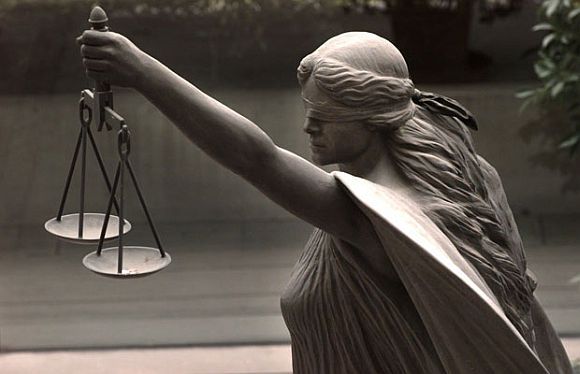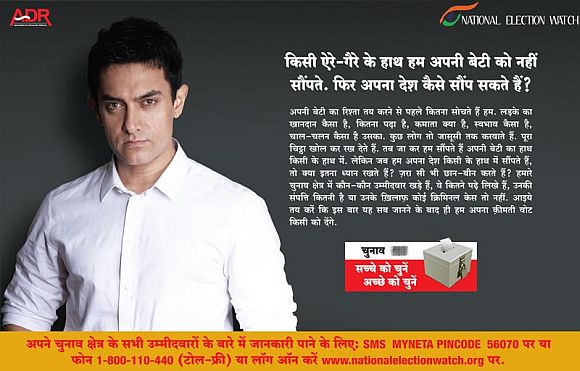Vicky Nanjappa
A recent report put out by the Association for Democratic Reforms and National Election Watch revealed that 47 per cent of the newly-elected Uttar Pradesh assembly has candidates with criminal cases pending against them.
Barring Manipur, none of the other four states that went to polls is free of a tainted MLA. In Uttar Pradesh, the number of criminal MLAs has gone up from 37 per cent in 2007 to 47 per cent in 2012.
In this interview with rediff.com's Vicky Nanjappa, ADR and NEW National Convenor Anil Bairwal says that they are doing their best to create awareness on the issue, but it is entirely up to political parties to do their bit.
There has been a jump in the number of criminal candidates. Has the battle been lost?
I would not say that. There is no doubt that the people want clean candidates. The problem is that these political parties, which are run in an autocratic and non democratic fashion, end up giving tickets to tainted candidates.
...
'What could the voter possibly do here?'
What do you think about the role of the voter who continues to cast his or her vote despite having such candidates?
The general voter can only vote for the names that are on the ballot paper. Unfortunately, there is nothing much a voter can do. In case the voter decides to boycott such a candidate, then he is blamed for not helping to make a change. Take the case of Uttar Pradesh. The state had so many red alert constituencies, which had all criminal candidates. What could the voter possibly do here?
What about the Election Commission's role? Do you think the body is not doing much about this issue?
The Election Commission can only do what it is chartered to do under the Constitution of India. They have to follow the law of the land and there is no law, which bars candidates with pending criminal charges from contesting the election.
Is there a role that the judiciary could play in this?
Yes, there is a big role in fact. The problem that we have come across after analysing the candidates is that there are many with cases which have been pending for years together. It is the job of the judiciary to take up these cases and dispose them off in a speedy manner.
'In the absence of a law, the job of the political parties becomes even more important'
Taking years for a trial to complete defeats the very purpose and the candidate can go ahead and contest as the case is pending. The law clearly states that only a candidate who has been convicted cannot contest the elections.
There is a clear problem on hand, legally. Do we give up or is there some other solution?
In the absence of a law in this regard, the job of the political parties becomes even more important to keep such candidates out of the system.
Your campaign appears to be more of an online o#8800 online viewership in our country is hardly 10 per cent. So does that approach really help reach the masses?
We have multiple ways of reaching the voter and the online campaign is just one among them.
The online medium is more for journalists who can use our data to carry forward the message to the voter.
During the Uttar Pradesh elections, we held a lot of meetings in various constituencies. We had multiple strategies to reach both the urban and the rural voter, including a toll free helpline giving out information regarding the candidates.
'All parties are the same. It is very hard to convince them to change'
Despite all the efforts put in by you, the number of candidates shot up. Why is this so?
At the end of the day, we are an NGO and cannot possibly be everywhere. Our political parties have become thick-skinned and unless there is this extraordinary pressure on them they will not react. You got to see the same in the Lok Pal bill. Despite such huge pressure they still did not buckle one bit.
When this being the case, do you expect them to pass a law in Parliament regarding criminal candidates? We are doing our best to create awareness and let us hope that the results are better.
Which party has been the most notorious when it came to fielding criminal candidates?
All parties are the same; I cannot tell the difference. It is very hard to convince them to change. Even when it came to filing IT returns, we were engaged in a battle for 2 years before we finally could get them to file the same. This issue of banning such candidates from contesting the elections had come up in the year 1990.
At that time they had said that there was no need for such a law because political parties were aware that they ought not to field such candidates. But did this happen? It needs to be done through public pressure as that alone has a chance of working so that we could have a changed scenario for the better.





article